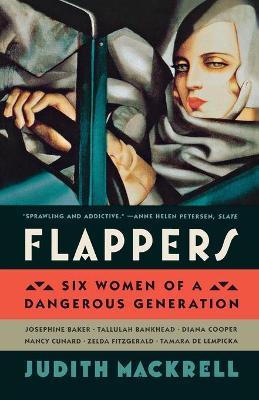
Glamorized, mythologized and demonized - the women of the 1920s prefigured the 1960s in their determination to reinvent the way they lived. Flappers is in part a biography of that restless generation: starting with its first fashionable acts of rebellion just before the Great War, and continuing through to the end of the decade when the Wall Street crash signal led another cataclysmic world change. It focuses on six women who between them exemplified the range and daring of that generation's spirit. Diana Cooper, Nancy Cunard, Tallulah Bankhead, Zelda Fitzgerald, Josephine Baker and Tamara de Lempicka were far from typical flappers. Although they danced the Charleston, wore fashionable clothes and partied with the rest of their peers, they made themselves prominent among the artists, icons, and heroines of their age. Talented, reckless and wilful, with personalities that transcended their class and background, they re-wrote their destinies in remarkable, entertaining and tragic ways. And between them they blazed the trail of the New Woman around the world.
Is it possible to be both ambitious and balanced?
The answer is yes, of course it is; there are manifold examples of men and women who have achieved great things while maintaining balanced, rational lives.
Reading books like Flappers though, one can't be blamed for wondering. No doubt that the more outrageous lives make more exciting reading, but as seems always the case after reading these omnibus biographies, I'm left with the feeling that these women - who inarguably achieved great things in the face of extraordinary obstacles - are not the ones we should be holding up as shining examples of success. At least Flappers doesn't outright label them as heroines as one similar recently published book hailed its subjects.
But boy, does the outrageous make for delicious reading (if you can overlook the numerous and egregious copy-editing errors). These women were rebellious, emotionally starved, unstable sometimes to the point of madness, and ambitious. Their determination and stubbornness were admirable, if their lack of moral compass was not. I'm not referring here, by the way, to their collective sexual escapades, of which I can only sit back and applaud with awe. It's more the way they all believed, no matter how humble or grand their beginnings, that the rules didn't apply to them.
About the only woman I came out of this admiring was Josephine Baker. While her compass most certainly did not point north, the author seems to chalk up some of this to naivety and ignorance (although I'm pretty sure she knew bigamy was a no-go and just didn't care). Diana Cooper might have also made it to a happy old age, but Josephine showed the most ability to adapt, to learn, to grow, and to do it all without seeming to compromise her dignity.
Take all this with a grain of salt, of course; condensed biographies like these are necessarily incomplete and leave out a lot of details that might change the reader's perspective, but the writing is engaging and Mackrell manages to connect all five women's lives into a relatively cohesive narrative. The women themselves do the rest.
Reading updates
-
Started reading
-
14 May, 2017:
Finished reading
-
14 May, 2017:
Reviewed
